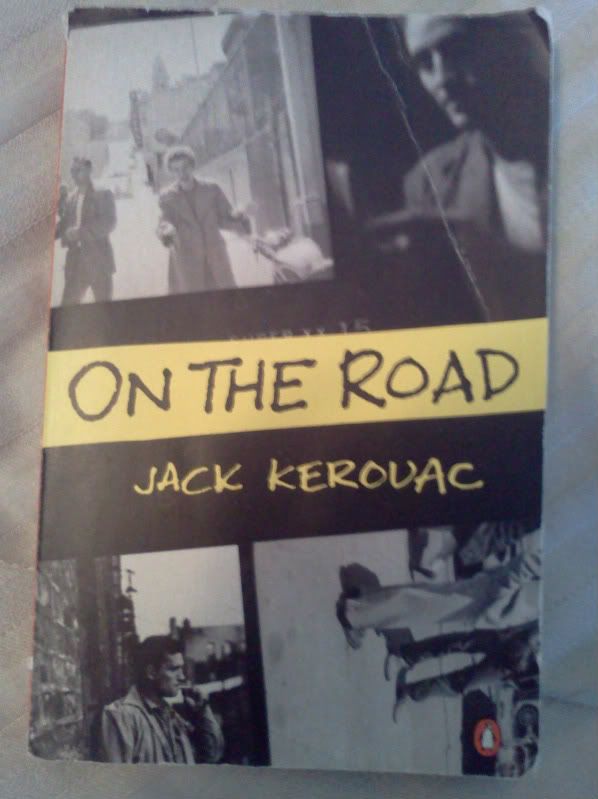Reruns tend to bore me. I change the channel if an episode I've already seen airs, and I don't enjoy watching most movies more than once. With tens of thousands of books to choose from each time I get the hankering to read, it's a wonder I would ever think to reread one. I don't do it often, but every now and again I feel the urge to revisit an old favorite.
As a reader, rereading a novel is like slipping into a well worn pair of jeans. It's effortless and comfortable. I know my way around the story. I don't have to expend much mental energy remembering character names and setting details. My mind paints a picture the moment I open the cover, and characters spring to life, fully envisioned.
Sometimes I choose to revisit a book based on the mood I know it will evoke. For instance, I just finished rereading a dear old favorite, Almost Heaven by Judith McNaught. While there are many things I love about this novel, the emotional punch in the gut McNaught delivers in the last quarter of the story is amazing. I suppose I must sometimes crave that vicarious agony, because I spent the first three quarters of this read-through waiting to see if that twist still pulled the rug out from under me. It did.
As a writer, I now approach rereads with a student's eye. My favorite novels become textbooks, and familiarity with the material allows me to zero in on points of craft: What details does this author incorporate to evoke setting? How do dialogue and narrative balance in this passage? What particular word choices in this sentence give it such exquisite lyricism? This last read of Almost Heaven also marked a bittersweet rite of passage, in that I found redundancies which should have been cut. Good news for my editorial sense, but it took the tiniest bit of the magic away, as well. Growing as a writer is not without some cost to being a reader.
How about you? Are there any favorites you come back to time and again, or do you never touch the same book twice?
Tuesday, February 28, 2012
Tuesday, February 21, 2012
Giveaway Winner!
Thanks to everyone who entered the Lowcountry Bribe giveaway! I've consulted the oracle random number generator and the winner is...
Alise!
 |
| Woo! Victory dance! |
Congratulations, Alise! I'll be getting in touch for your shipping information.
If you didn't win, please get your hands on Lowcountry Bribe by whatever legal means you can. Amazon now has the Kindle edition available.
Thanks again for the interview, Hope, and thanks to everyone who entered the giveaway. You're all the very best!
Monday, February 20, 2012
The Welcome Fruit
Angers, France is a small city nestled in the heart of the Loire Valley. Its ancient city wall and fortified chateau were exotic to my small town, Southern eyes when I arrived there for my semester abroad. I loved to wander the narrow, cobbled streets and admire a world so very different from my own. The age of the place was overwhelming. Stone buildings which had stood for centuries cast cool shadows over me, the daughter of a young country, making me feel small. When people asked where I was from, no one had heard of Caroline du Sud. "Is that near New York?" they'd ask. If the inquirer knew the approximate location of Florida, I'd say my state was in the neighborhood and leave it at that. Talk about humbling.
So it was with these feelings of displacement that my roommate and I went walking one day. On this particular morning, I paid especial attention to the decorative carvings in the edifices of even humble structures. I saw fleur de lis, dates, saints, gods and goddesses--and then I stopped in my tracks. Carved into the lintel above a door was that most Southern (I thought) of devices: the pineapple. My whole life, I had seen this fruit adorning bed posts, door mats, knockers, brass finials, generic office decor, and Tour of Homes mansions. I expressed my astonishment at seeing it here, and my roommate blurted, "The pineapple is the welcome fruit!"
The lore explained to me by a 19-year-old hopped up on cigarettes and a triple shot of espresso went like this: Back in the old days, sailors who visited tropical locations returned with pineapples. After recuperating from the voyage, a pineapple placed outside let friends know the family was ready to receive visitors.
While I have been unable to authenticate this particular use of the pineapple, it is indeed an old symbol of friendship and hospitality. Before Columbus' voyage across the Atlantic, sugar was a rare, expensive treat in Europe. He returned from his second trip to the Americas with Caribbean pineapples amongst his cargo, and they became an instant object of desire. The difficulty in transporting the pineapple from its tropical abode to Europe made it extraordinarily costly. On both sides of the Atlantic, the ability to obtain pineapple became a show of wealth, and serving the sweet fruit to one's guests was the ultimate gesture of generous hospitality.
For a region renowned for its charm and hospitality, it makes sense that the South is awash in the pineapple motif. My insulated, young self thought it, like grits, was a Southern thing. Little did I know then that the decorative history of this delicious fruit wound back centuries and spanned oceans. Finding this common thread in a foreign land made me feel less out of place. The pineapple served its purpose that day. It bade me welcome and gave me comfort, the ultimate gift to a guest.
 |
| Angers is also known for that whimsical artwork, The Tapestry of the Apocalypse. |
So it was with these feelings of displacement that my roommate and I went walking one day. On this particular morning, I paid especial attention to the decorative carvings in the edifices of even humble structures. I saw fleur de lis, dates, saints, gods and goddesses--and then I stopped in my tracks. Carved into the lintel above a door was that most Southern (I thought) of devices: the pineapple. My whole life, I had seen this fruit adorning bed posts, door mats, knockers, brass finials, generic office decor, and Tour of Homes mansions. I expressed my astonishment at seeing it here, and my roommate blurted, "The pineapple is the welcome fruit!"
The lore explained to me by a 19-year-old hopped up on cigarettes and a triple shot of espresso went like this: Back in the old days, sailors who visited tropical locations returned with pineapples. After recuperating from the voyage, a pineapple placed outside let friends know the family was ready to receive visitors.
 |
| Don't you just want it to hug you in greeting and kiss your cheeks? |
For a region renowned for its charm and hospitality, it makes sense that the South is awash in the pineapple motif. My insulated, young self thought it, like grits, was a Southern thing. Little did I know then that the decorative history of this delicious fruit wound back centuries and spanned oceans. Finding this common thread in a foreign land made me feel less out of place. The pineapple served its purpose that day. It bade me welcome and gave me comfort, the ultimate gift to a guest.
* * *
On that note, I'd like to extend a very warm welcome to the lovely new faces here at the Ball. I'm so glad you're here. Thank you for coming by, and I hope to see you often.
Thursday, February 16, 2012
Interview with C. Hope Clark and a Giveaway
Do I have a treat for you today! I am thrilled to introduce you to C. Hope Clark, founder of the much-acclaimed FundsforWriters.com and author of the newly released mystery novel, Lowcountry Bribe (Bell Bridge Books, 2012).
Threats, a missing boss, a very dead co-worker, a high-level investigation and a sinister hog farmer: Lowcountry Ag Department manager Carolina Slade is a bean-counting civil servant in hot water.
Carolina Slade is a by-the-book county manager for the Department of Agriculture-a civil servant who coordinates federal loans for farmers in the coastal lowcountry of South Carolina. When one of her clients, a hog farmer named Jessie Rawlings, offers her a bribe, Slade reports Jessie to her superiors. The next thing she knows, she's besieged by Resident Agent-In-Charge Wayne Largo from the Feds' IG Office in Atlanta. He and his partner have come to investigate Slade's accusations, and if possible catch Jessie in the act of handing over money.
However, the IG isn't telling Slade everything. The agents are also investigating the disappearance of Slade's boss the year before in connection to possible land fraud. And when the sting on Jessie goes bad, the case is put on hold and Wayne is called back to Atlanta, leaving Slade to fear not only for her life and job, but for her childrens' safety.
Feds and farms and frauds, oh my! Everybody say hi to Hope:
Hope has graciously granted me an interview--a Bluestocking Ball first! Read on to get to know Hope and Carolina Slade, and then enter the giveaway for a chance to win an autographed copy of Lowcountry Bribe.
CHC: I've enjoyed this ride with Carolina Slade immensely, and hope to continue this trek as long as I'm allowed. There's a magic to fulfilling a dream, which for me was publishing a mystery. To have it evolve into a series, with a traditional publisher as treasured as Bell Bridge Books, is more than I could have imagined. From the first time I laid pen to paper to the recent release date was 14 years, starting and stopping. The story's been discarded and written from scratch twice. It's been edited at least a dozen times via other eyes than mine. But I can say that each delay, every obstacle that made me return to the keyboard, was a back step worth taking. Amazingly, when I pulled out my very first full manuscript from eons ago, I cringed at the writing. But the title made my mouth drop open. It was called Lowcountry Bribery, and I'd forgotten that. A real wow moment that told me this was meant to be.
Readers are invited to visit the new website at www.chopeclark.com . I'm proud of it, and there they can learn a little more about Lowcountry Bribe, Carolina Slade, C. Hope Clark, and see where this magic carpet ride is taking us in 2012.
If you would like to purchase Lowcountry Bribe, it's available from Bell Bridge Books, Amazon, and Barnes & Noble. I understand e-book versions for Kindle and Nook are on the near horizon, so keep your eyes peeled for those.
Thanks for hanging out at the Ball, Hope. It was a pleasure to have you!
Threats, a missing boss, a very dead co-worker, a high-level investigation and a sinister hog farmer: Lowcountry Ag Department manager Carolina Slade is a bean-counting civil servant in hot water.
Carolina Slade is a by-the-book county manager for the Department of Agriculture-a civil servant who coordinates federal loans for farmers in the coastal lowcountry of South Carolina. When one of her clients, a hog farmer named Jessie Rawlings, offers her a bribe, Slade reports Jessie to her superiors. The next thing she knows, she's besieged by Resident Agent-In-Charge Wayne Largo from the Feds' IG Office in Atlanta. He and his partner have come to investigate Slade's accusations, and if possible catch Jessie in the act of handing over money.
However, the IG isn't telling Slade everything. The agents are also investigating the disappearance of Slade's boss the year before in connection to possible land fraud. And when the sting on Jessie goes bad, the case is put on hold and Wayne is called back to Atlanta, leaving Slade to fear not only for her life and job, but for her childrens' safety.
Feds and farms and frauds, oh my! Everybody say hi to Hope:
| Hi, Hope! |
Hope has graciously granted me an interview--a Bluestocking Ball first! Read on to get to know Hope and Carolina Slade, and then enter the giveaway for a chance to win an autographed copy of Lowcountry Bribe.
Elizabeth Boyce: Your main character, Carolina Slade, works for the U.S. Department of Agriculture. I understand you also have employment history with this agency. Can you tell me about that? Was your work similar to Slade's?
C. Hope Clark: I have a long history with USDA, starting from straight out of college as a loan specialist with my agronomy degree from Clemson University. I made loans to rural homeowners when many lenders would not invest in country real estate because of their iffy appraised values and low resale. I moved up into farm lending, which can get quite complicated, and ran one of the largest farming counties in South Carolina - Orangeburg. Became the highest ranking farm loan specialist in the state for a short while, before others climbed the ladder behind me. Then I moved up into management, where I became more involved in the politics, the nonprofit relationships, the business and small town lending and grant programs, then ultimately I assumed the role of Special Projects Representative much like Carolina Slade. I had oversight over personnel and budget and even investigations. The title changed to Administrative Director over time, but I liked the Special Projects title for Slade - sounded more intimidating.
| You do NOT want to lie to this woman about your peanut crop. |
Nobody thinks of agriculture having much crime, but in actuality, it has cases, situations, and investigations like any other part of the government. I experienced clients (and employees) who stole, embezzled, committed suicide, committed identity fraud, got wrapped up in porn, disposed of stolen collateral, lied to get funds, couriered drugs, and so on. Those experiences helped me mold Carolina Slade's character and escapades. On top of that, my husband was a USDA OIG Special Agent, much like Wayne Largo in Lowcountry Bribe. He's experienced more cases than I, and at a higher level with more complexity. Between us, we enjoy creating dilemmas for Slade.
EB: Slade is a mother, with two young children. The protagonists of most mystery novels aren't parents. Can you tell me a little bit about why Slade is a mother? Was this a trait you consciously chose to incorporate into her character? And do the kids play an important role in the plot?
CHC: I was hell bent on infusing kids into this mystery series. Female sleuths, most sleuths, actually, are written without the baggage of children. The trouble is, many female sleuths in real life have children. Police, detectives, and agents marry and procreate, and their IQ's don't drop because they used their womb. For some reason, in this genre, women are dumbed down into cozies once the author inserts children in the mix. I wanted Slade to be a sleuth, edgy yet compromised, while also bearing the burden of caring for kids. In the long run, the kids turned out to be a great addition. They become involved in Lowcountry Bribe, endangered, and as a result, Slade has to step outside her comfort zone and perform at a new level. But Zack and Ivy give Carolina Slade a separate dimension. Family as a whole gives her a degree of savvy that can only improve the depth of these stories.I think women will appreciate a sleuth with children - a sleuth that isn't a forensic scientist, crusty single detective, or some babe cop the other cops discriminate against. I wanted nothing to do with stereotypes. I once worked cases with children in school, worrying about who cared for them when I went out of town. Slade can as well.
EB: I write historical fiction, so I'm always looking for the historical angle in novels. Lowcountry Bribe is contemporary fiction, but is set in South Carolina, a state overflowing with history. To what extent does history influence your novel?
 |
| Note to non-Southerners: The tea back there is sweet. |
CHC: I'm a believer that history is key to any story. We are products of history whether it's our great aunt's or grandfather's teachings, or because we live in a town filled with monuments, a place instrumental in the Civil War. Lowcountry Bribe is set in Charleston, only not the city - the county. But families out on the islands of Charleston County can often trace heritage back to the Civil War era. I grew up in that area of South Carolina, so I know that the food, celebrations, architecture, art, and even the agriculture have history embedded in them. I traced my genealogy back to pre-Civil War and learned I had five distant uncles and a distant grandfather who fought for the Mississippi Infantry. Slade is actually the last name of that branch of the family tree on my mother's side, so I gave the name to my protagonist. And I made that history Slade's, a fact that comes out when she's doing title research in the Charleston courthouse. When you understand why something or someone is like it is, based upon history, you can write more freely, more factually, more realistically about them, and the reader appreciates it without exactly knowing why. He just enjoys the story. History will play a major role in all my stories. History is important and too often taken for granted when it's what helped shape us into who we are today.
EB: Along those lines, how much does the setting drive the story?
CHC: Setting is very important in my stories. I'm in awe of South Carolina, its history and its backbone. Having over two decades traveling its rural regions with USDA, I felt that readers would enjoy background other than the standard urban setting. I want people to realize that the country is full of life . . . and crime. Rural has a life of its own, and it can be colorful in ways that an urban-based story could never realize. The Carolina Slade Series will visit a different part of South Carolina in each book, and might even cross over into neighboring states, but it will be Southern. Lowcountry Bribe takes place in Charleston County, particularly the Edisto area. The second book is set in Beaufort, particularly St Helena Island. The third book takes readers to Pelion and rural Lexington County. The average person has never heard of, much less visited, these areas. So setting becomes as inviting as the characters or any plot ploy. It's important to me not to take setting for granted.
EB: Last question: I'm buying. Bourbon, beer, or wine?
CHC: I'm chuckling at that question. Personally? Bourbon. On the back porch overlooking the lake. But in presenting my manuscript to the editor for the first round of edits, she took issue with Slade favoring beer and the occasional bourbon. She wanted Slade to be more lady-like and enjoy her wine. OMG, that is not Carolina Slade. So . . . to accommodate all involved, I painted Slade like this (from Lowcountry Bribe) . . .
To this day I drank bourbon thanks to my daddy. The occasional taste for wine came from Mom. My mood dictated which I preferred, which often meant a can of beer just to be me.
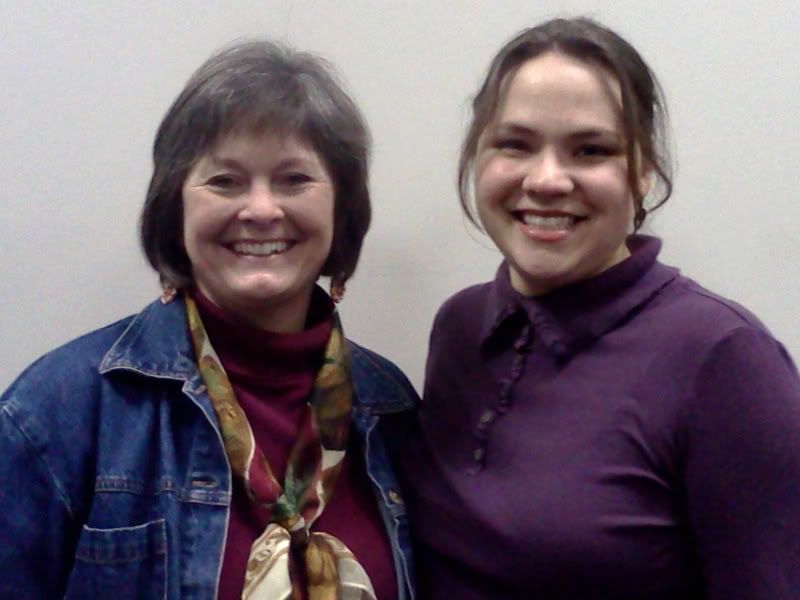 |
| C. Hope Clark and E. Boyce. One of these days I'll get a decent camera. |
EB: Anything else you'd like to add?
CHC: I've enjoyed this ride with Carolina Slade immensely, and hope to continue this trek as long as I'm allowed. There's a magic to fulfilling a dream, which for me was publishing a mystery. To have it evolve into a series, with a traditional publisher as treasured as Bell Bridge Books, is more than I could have imagined. From the first time I laid pen to paper to the recent release date was 14 years, starting and stopping. The story's been discarded and written from scratch twice. It's been edited at least a dozen times via other eyes than mine. But I can say that each delay, every obstacle that made me return to the keyboard, was a back step worth taking. Amazingly, when I pulled out my very first full manuscript from eons ago, I cringed at the writing. But the title made my mouth drop open. It was called Lowcountry Bribery, and I'd forgotten that. A real wow moment that told me this was meant to be.
Readers are invited to visit the new website at www.chopeclark.com . I'm proud of it, and there they can learn a little more about Lowcountry Bribe, Carolina Slade, C. Hope Clark, and see where this magic carpet ride is taking us in 2012.
* * *
THE GIVEAWAY IS NOW CLOSED. THANKS FOR ENTERING!
If you would like to purchase Lowcountry Bribe, it's available from Bell Bridge Books, Amazon, and Barnes & Noble. I understand e-book versions for Kindle and Nook are on the near horizon, so keep your eyes peeled for those.
Sunday, February 5, 2012
Ozymandias
I met a traveler from an antique land...
Believe it or not, every now and then I have to dispose of books. Shocking, I know. But for an avid acquirer of books, there's only so much space one can give to one's hobby. New books come in and in and in, and eventually the children want to know why their bed pillows have been replaced with paperbacks stuffed into shams. That's when I know it's time for a cull.
We have donated books to the library and charity auctions, and passed them along to friends. Even though parting with books stings, I know they're going to good homes. This is the only way I can bear to do it.
But there are some books that always give me pause as I sort through the stacks, deciding what stays and what goes. These books I pull from the shelf, open the front cover, and smile--sometimes wistfully, sometimes joyously. These books were gifts.
When I encounter the books people have given me over the years, they take me back to a particular point in time as effectively as a photograph. They represent where I was in my life, or where the giver was in his / her life. The inscriptions written inside are as meaningful to me as the text of the book itself.
And on the pedestal these words appear:
This one was given to commemorate a graduation.
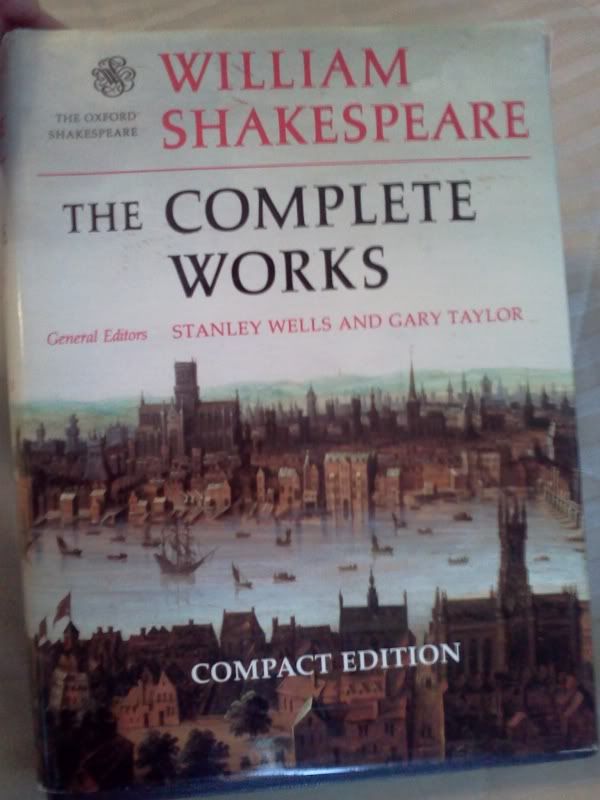 |
| Graduation Day 1997 |
One gift represented a time of youth and discovery, of the blossoming fire that comes with embracing life and forging new relationships.
I've received some that are pure nostalgia.
 |
| May you live all your life with the words and wisdom of Rhyme and Reason... |
And one that's traveled the world, finding its way into the hands of several burgeoning writers, with multiple inscriptions to go with it.
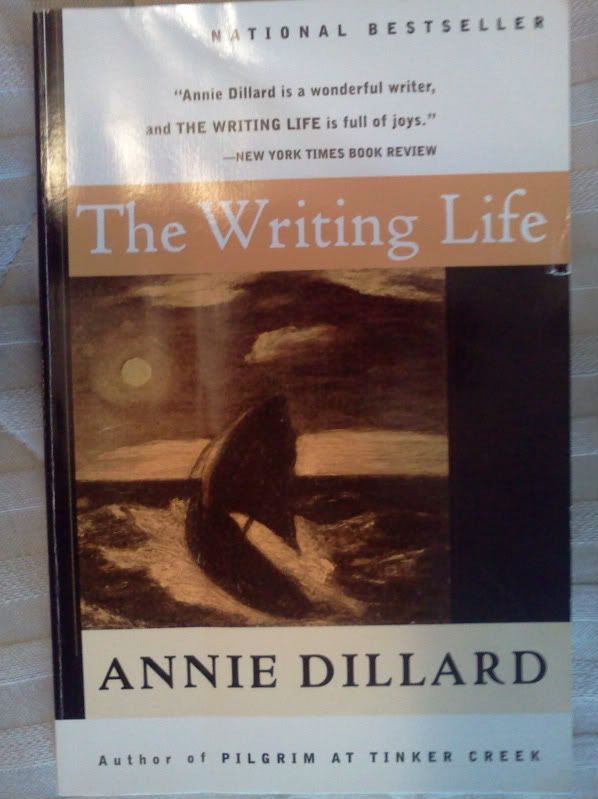 |
| This is from a waitress in a cafe in Flagstaff. "Writing down the Bones" I love you! --and I know you'll do it all!! May this help guide you through your quarter-life crisis. |
Beautiful books that are a joy just to hold and admire.
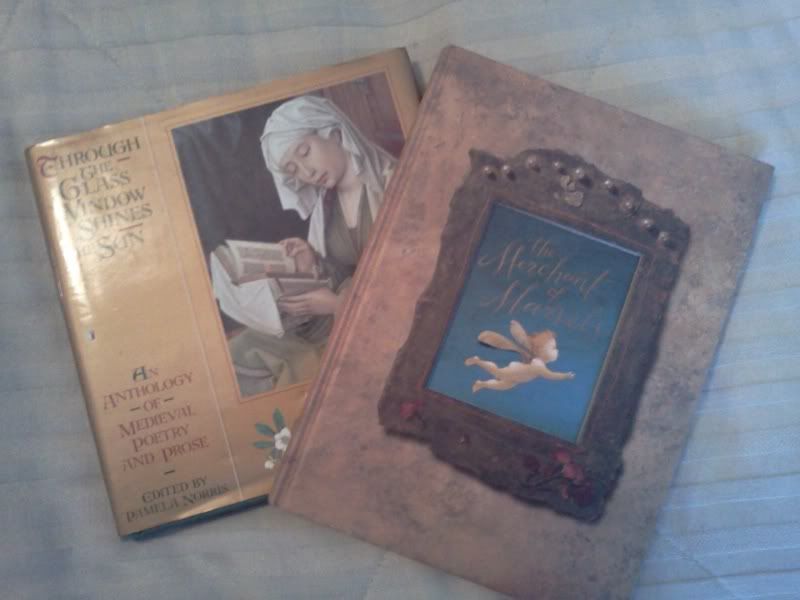 |
| A special book for a special person! Chase all those dreams. |
And others to mark the changing seasons of my life.
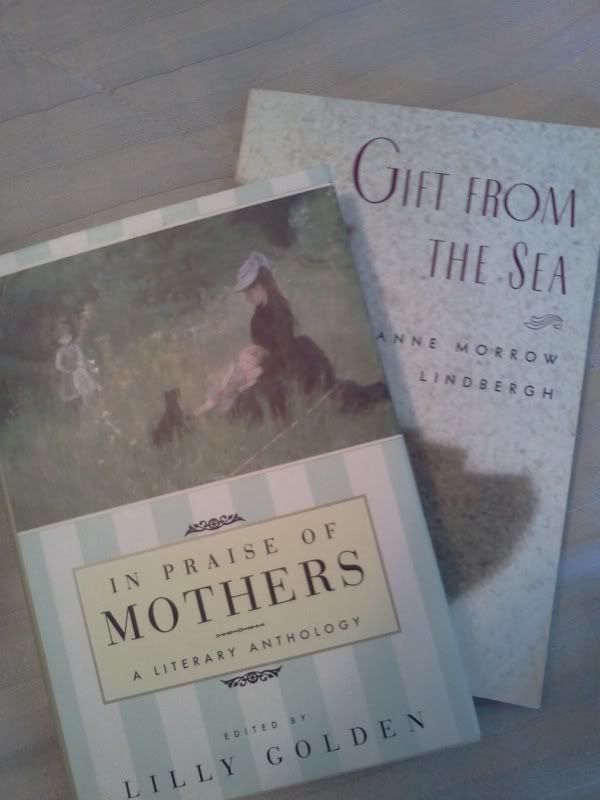 |
| The greatest thing I ever did was become a mother. May you always honor your stewardship. |
And yes, there are books from loves past.
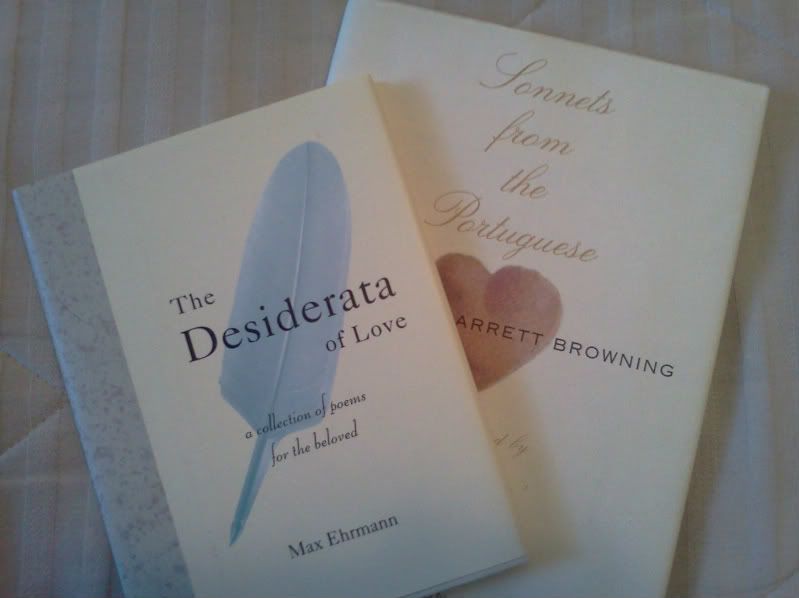 |
| These inscriptions are not for you. |
Nothing beside remains.
Some of the people who have given me books are no longer in my life. People change and drift apart. Time separates us. Wounds run too deep to heal. But the books, the words on my shelf, stand testament to what once was.
The weight of the book, the smell of the paper, the intimacy of words written in ink; these connect me to times long gone in ways both concrete and insubstantial. They are brief visits with old friends, fleeting memories of love shared, evidence of affection given and received. These will always have a special place on my shelf and in my heart.
The lone and level sands stretch far away.
Thanks and apologies to Percy Bysshe Shelley
Subscribe to:
Comments (Atom)



